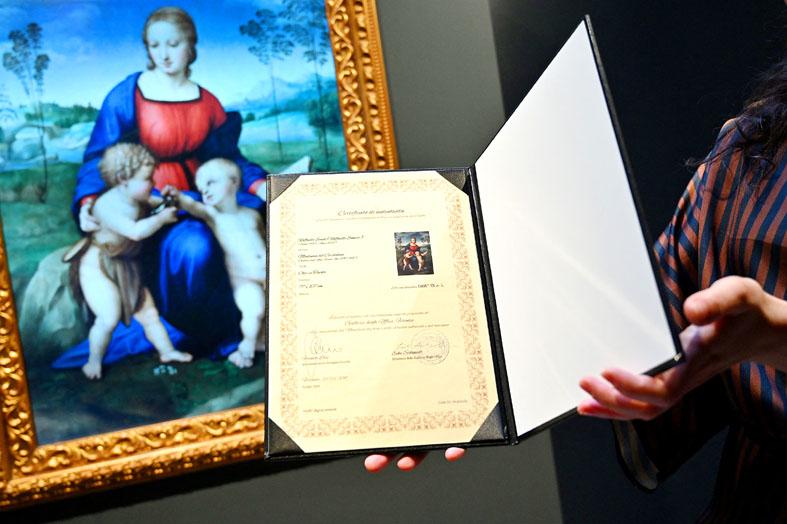The art market is pushing forward with rocky romance with NFTs

The closest most people get to owning a world-renowned work of art is buying a cheap poster from a gallery, but art dealers are determined to exploit technology to attract new collectors.
Anaida Schneider, a former banker based in Switzerland, is among those promoting new ownership arrangements – for a small fee, investors can buy a digital part of a painting and share in the profits when she sells.
“Not everyone has $1 million to invest,” she told Agence France-Presse. “So I came up with the idea of splitting, to create like a mutual fund, but on the blockchain.”

Photo: AFP
Each buyer receives a non-fungible token (NFT), the unique digital unit created and stored on the blockchain, the code that underpins cryptocurrencies.
Although this year has seen cryptoassets rout with falling values, collapsing projects and widening scandals, the NFT art sector has weathered the storm better than other parts of the crypto world.
NFT artwork accounted for about $2.8 billion in sales last year, and the rate has fallen only slightly in the first half of this year, analyst firm NonFungible said.
Collectors and artists are among the most eager to experiment with the technology, even if it means owning just a piece of a digital copy of a painting.
A fifth of 300 collectors polled by the website Art+Tech Report said they had already engaged in so-called fractional ownership.
Schneider’s Liechtenstein-based firm Artessere offers squares of paintings by Soviet artists including Oleg Tselkov and Shimon Okshteyn for 100 euros to 200 euros (US$100 to US$201) a piece. She gives herself 10 years to sell them on.
Schneider owns the paintings she sells, thus avoiding legal complications, but attempts to offer new digital ownership arrangements for publicly owned works are proving more difficult.
Thirteen Italian museums recently signed deals with Cinello, a company that sells limited-edition digital reproductions, to offer ownership of digital copies of masterpieces.
The buyer receives a unique, high-resolution digital copy to project on a screen and a certificate from the museum, which receives half the proceeds.
The firm in February held a splashy London show displaying digitized works by Renaissance masters including Raphael, Leonardo and Caravaggio. It has since sold a handful of them.
However, the Italian Ministry of Culture was reportedly annoyed that a copy of Michelangelo’s Doni Tondo sold for around 240,000 euros, but Florence’s Uffizi gallery received less than a third of the proceeds.
A ministry spokesman last month said the issue was “complex and unregulated” and told museums not to sign any new contracts involving NFTs.
Cinello manager Francesco Losi was not happy with the characterization, saying: “We don’t sell NFTs.”
Buyers can request an NFT to go with their image, but the firm said it had its own patented system to ensure ownership, which it calls DAW.
Cinello said it had digitized more than 200 works and the sale had generated 296,000 euros in additional revenue for Italian museums.
However, the firm’s difficulties in Italy underscore the mixed blessing of NFTs.
The NFT sector – which covers everything from avatars in PC games to million dollar cartoon monkeys – is rife with fraud, counterfeit works, theft and laundering.
Losi said he was well aware that NFTs could be used “in the wrong way” and was uncertain about their future in the art world.
Schneider said her project was protected by law in Liechtenstein, which in 2019 was among the first jurisdictions to pass a law regulating blockchain companies.
Beyond that, she said her insurance would cover damage to the artworks, and she had also factored in the possibility that the paintings would drop in value, although she declined to give exact details.
“I hope it never happens,” she said. “For me, it’s very important to get this idea out into the market.”
Comments will be moderated. Keep comments relevant to the article. Comments containing offensive and obscene language, personal attacks of any kind or advertising will be removed and the user banned. The final decision will be at the discretion of the Taipei Times.
























